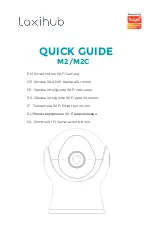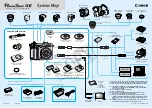
Document:
RY-BCC8 1G4
Document:
RY-BCC8 1G4
Document:
RY-BCC8 1G4
Page:
1
Page:
1
OWNER'S MANUAL
RY-BCC8 IP camera license plate
DSE srl - Digital Surveillance Equipment - WWW.DSE.EU
RY-BCC8
PRODUCT DESCRIPTION
This IP camera is made to allow the resumption of license plates of vehicles in slow or fast
motion. It can operate in any light condition thanks to the illuminators embedded white light.
Thanks to a High-Light Suppression system is not influenced by
headlights of means that is dazzling
dipped.
Compatible with ONVIF protocol can be combined with any management system or NVR that
supports this standard. RY-BCC8
is
a
IP camera "naked". The DSE cameras in
this series are not capable of recording
independently of the SD card or NAS,
and are provided free software for your
PC or mobile APP.
They are developed to work with an NVR or an external recording software which is delegated all
the video system management. If you choose a camera NAKED, premuratevi to also purchase an
NVR.
Excellent in combination with this camera are our NVR series DN that allow you to make the
FullHD resolution to 100% and
real-time frame rate of
camera.
RY-BCC8 is still compatible with any NVR or software platform on the market as long as they
conform to the ONVIF standard.
ASSEMBLY
The cameras are equipped with a mounting bracket for wall built to allow the passage of cables
within it.
The bracket is mounted generally in
matching output cables. The basis of
fixing
It has 4 holes for fixing to the wall with dowels. The housing is waterproof and can be installed
outdoors without any protection.
The housing is air-conditioned and is equipped with a fan which is activated at above 45 ° and a
heater that is activated at below -5 ° C.
POSITIONING
The positioning of the camera it is very important for a good yield of the license plate reading. The
optimal recovery of the plate is carried out at a maximum distance of 30 m. depending on the
adjustment of the lens. The first thing to check is therefore that the distance as the crow flies (not
walkable on the ground) between the camera and the point where you will find the means does
not exceed this distance otherwise
the illumination of the LEDs will not be
effective.
The second thing to consider is to position the camera so that the light of the
headlights is not
directly oriented towards the camera, while maintaining at least an angle of 30 ° vertically with
respect to lighting of the headlights. The camera will then be placed in detected position with
respect to the road surface. The minimum angle of 30 ° must also be respected in order to avoid
dazzling of the driver whereas the LEDs emit white light.
Satisfied 2 previous points in orienting the camera needs to be done so that the plate remains as
long as possible in the field of vision of the camera. The optimal reading is obtained by framing a
single lane, but you can take up to 3 lanes with a satisfactory reading.
The camera operates indifferently framing the rear or front plates.
CONNECTIONS
The connections on the output cable from the camera are the following:
Jack DC12V -
We must connect a 12VDC power supply stabilized by at least 2,000 mA, such as
Jack DC12V -
We must connect a 12VDC power supply stabilized by at least 2,000 mA, such as
Jack DC12V -
We must connect a 12VDC power supply stabilized by at least 2,000 mA, such as
RE-AL5 model (not included).
These cameras, also support the power
POE by network switches.
If you are using the power
These cameras, also support the power
POE by network switches.
If you are using the power
These cameras, also support the power
POE by network switches.
If you are using the power
POE, the 12VDC plug must not be connected.
Network RJ45 socket
- Network port to connect to a switch
Network RJ45 socket
- Network port to connect to a switch
BNC video output
- It 'provides a BNC female connector to which you can connect an analog
BNC video output
- It 'provides a BNC female connector to which you can connect an analog
monitor laptop useful for adjusting the lens. Do not use this video out for license plate reading
because of lower resolution to digital streaming.
TARGET
Adjust zoom / focus
- The camera mounts an adjustable objective lens from 5 to 50 mm.
Adjust zoom / focus
- The camera mounts an adjustable objective lens from 5 to 50 mm.
autoiris DC drive. Once the camera is positioned it is necessary to orient the bracket and
appropriately adjust the lens. To adjust the lens remove the rear plastic protection of the camera
and open the top cover. initially act on the ZOOM ring (TW) and adjust the amplitude of the frame
(wide angle / zoom) based on the area to be framed. Remember that in most wide angle
corresponds
inevitably a lower
image detail.





















